The Manatee Pond
17th January 2009:
[long entry…]
It was past eight o’clock, and I was still waiting for Mr. Boodoo. Or rather ‘Shortman’, his sidekick, who Mr. Douglas had said would come to pick me up.
Heavy grey clouds held the promise of rain. I watched them pile up as the clock turned to eight-thirty, then ten to nine.
“Still playing the waiting game?”
I wondered what it looked like to Mr. Douglas. He’d seen me arrive with a different guy every day, and now I was sitting and waiting for half a morning—after having waited in vain for Truckman for half a day—to be picked up by yet another man.
But he knew Mr. Boodoo. “It’s odd,” he said. “He is normally on time. This is not at all businesslike.”
Mr. Douglas let me use his phone and Mr. Boodoo sounded surprised that nobody had come to pick me up. At least he hadn’t forgotten about me.
“Hold on,” he said.
I did.
*
Shortman arrived five minutes later, with two boys in their early twenties along for the ride. He apologised for being late, but he wasn’t serious. Neither was I. They were here: that was all that mattered.
“It’s Saturday,” he said. It’s our time for liming!”
And with that we were off to d’Hammerhead Bar.
*
“Look at that moth,” Shortman said and grabbed my arm. Something about his eyes made me hesitate. A moth?
I looked and my heart stopped for an instant.
It sat there under the ceiling like a painting, each wing the size of my hand. A museum-specimen come to life. Except that I knew that it wouldn’t move again until dark. With that insight, I could breathe again.
The jungle had come to the bar, and it was time for us to leave.
I wondered when—and if—we would meet the mysterious Mr. Boodoo as we drove up to the RAMSAR sign that marked the entrance to the Protected Area. The school-maxi driver had told me that here I would find guys who knew the swamp. The guy in question lived in a house right next to the sign. His name was Bobby.
He showed me his catch of calalloo crabs and cascadoo. The crabs sold out before we had finished lunch: a delicious curry stew prepared by Shortman who maintained that men were the better cooks.
I found these men a refreshing change from those I had encountered so far.
Living next to the swamp, catching fish and crabs, looked like an idyllic lifestyle, at least at first sight. But I noticed the scars on Bobby’s arms and back. Rainwater barrels which were the only source of drinking water.
I swatted at a mosquito.
Not so idyllic at second sight, perhaps.
We had lunch, and more rum and coke, but the rain continued relentlessly, so eventually Shortman launched the boat and the boys—Alan and Kishan—followed. They carried the glasses and the coke, I put the bottle of rum into my daypack.
Shortman drove at break-neck speed down winding canals which cut like veins through the expanse of grass and reeds. We rounded a bend and a dense growth of mangrove tunneled above our heads. I feared that at any moment we might be impaled on one of the lance-like roots, but Shortman steered the boat with practised ease.
“There are no manatees here, I take it?”
“Not here,” he confirmed as we ran aground with a thump. A mound of soil signalled our arrival at Bush-bush, one of six islands in the swamp and the first stop on our eco-tour.
The heavens opened once more. We sought shelter in a wooden hut which the boys said would make a great liming venue.
“We could get our girlfriends to come over, so you have company you can relate to!”
“Oh, so you two are spoken for?”
“We are,” said Alan. “He’s not.” He pointed at Shortman.
“I think we should wait for better weather,” I said, slapping at another mosquito. My bug spray had been washed off before I had even climbed into the boat.
The rain meant that the wildlife kept a low profile. We saw two bedraggled blue and gold macaws cowering on a branch inside a huge enclosure.
“These are from the pet trade,” Shortman said. “We are going to release them. Once blue and gold macaws flew wild here, a flock of about fifty. We’re working with Cincinnati Zoo to rehabilitate them. We have released 32 birds since the year 2000, and 42 chicks have hatched.”
The enclosure suddenly made sense. It felt as if the light among the dripping branches had grown a little brighter.
Shortman kept disappearing into the bush, but returned every time shrugging his shoulder. Only the plants complied with the sightseeing plans. He pointed out a Babandi tree, the bark of which is used as an aphrodisiac, and a cannon ball tree, the fruits of which look just as described. A climber clinging to its trunk offered up spectacular flowers. They smelled like roses.
Shortman kept scanning the branches and eventually spotted some red howler monkeys: three females and a baby, quietly moving into a tree just next to us. The light was so poor that he had to point them out repeatedly before I could see them. There were no males present, and it was eerily silent.
As we returned to the hut we found a group of people sitting on a tree trunk, having a picnic of disgusting little Vienna sausages, white rolls and soft drinks. They looked like they had been there for a while, but they must have only just arrived. Ours was the only boat, but it is possible to walk through the swamp if you know your way. As with Samuel the policeman, I was taken aback by these urbanites who moved through the swamp and jungle with such assurance.
Shortman demanded to see their permits. “Have you had your yellow fever shots?”
Wordlessly, the older of the two men handed him the documents. He wore a shirt embroidered with the Public Health Authority logo.
I stared at Shortman. “Are you serious? Is there yellow fever here?” So far it had only been a rumour.
The monkeys are falling from the trees.
The PHA official frowned at me. “You should get your shot,” he said. “Get it today. The health centre is open until three.”
I continued to stare at Shortman, who didn’t flinch. This was crazy. Besides, it was already past noon.
We discussed this back at Bobby’s. Shortman, Bobby, the boys and all the rangers and local hunters were due to get their yellow fever vaccinations on Monday. On Monday, I would fly to Barbados and then home.
I resolved to swing by Sangre Grande Health Centre on my way to Port of Spain. They ought to be open on a Sunday. [Note: the SG hospital didn’t have any vaccine. It would have been too late anyway; you need your shot at least one week before entering an affected area.]
*
It was almost three by the time we pulled up at the rusty gate of the Manatee Field Station. The field station may no longer serve as a permanent base for the MCT, but it marks the entrance to what is affectionally known as the Manatee Pond.
“Can you handle a kayak?” Shortman asked.
Getting into the boat without capsizing proved to be a bit of a challenge, but once ensconced it fitted me like a glove. Half-forgotten sessions with the St. Andrew’s University Canoe Club came flooding back. I glided out onto the water, then paddled furiously to keep up with Shortman who had swept by with barely a splash.
Kishan and Alan followed behind in a two-seater, both trying to paddle in opposite directions.
For the time being—until the boys could agree on a direction and catch up with us—Shortman and I glided side-by-side, looking out for manatees.
“You may not see much,” he cautioned in a wisper. “A pair of nostrils, if you’re lucky.”
“I know. It’s—”
He held up a hand, pointing.
There ahead, a ripple. A trail of bubbles. Then it was gone.
A shout and a splash announced the boys entering the scene. They grinned at us and darted past down the river.
“Not so fast,” I shouted, but they were gone.
Shortman paddled into the mangroves, running his kayak up against the woven roots. He could go no further.
“Do the manatees go in there?” I asked increduously.
He nodded. “It’s easier to see them in the dry season, when the water level is lower.”
Trini manatees have survived against the odds, their instincts honed by generations of being hunted. They were lying low in our presence. But they don’t enter the mangroves merely to hide.
The mystery of what they feed on was solved when Shortman told me that they graze on the vegetation along the banks, sticking their heads right out of the water.
“Look,” he said. But I saw nothing except perhaps a fleeting shadow. Another ripple that might have been a fish.
And then a definite splash, followed by shouting.
The boys had had a disagreement about which way to lean and had ended up in the water. Much splashing and waving ensued. I paddled up to the opposite side of their kayak, so that we might attempt a standard rescue, but Shortman handled the situation more-or-less single-handedly.
Kishan blew water out of his nose and grinned. “First time in a kayak,” he said. “Looks easier than it’s done.”
Shortman pulled the boys to the perch opposite the small canal that led up to the field station and directed them to empty the water out of their kayak. Then he ordered them back to base, but not before they capsized again.
I glanced up at the perch. A jetty, complete with ladder, led up to an observation hide. I would have loved to spend a few hours there, but Shortman pressed on. We glided soundlessly down the other side of the river, and with the boys gone, we got a definite feel that the manatees were close. Ripples and trails of bubbles showed where they swam just below the surface.
It was almost as if they were following us.
“There, do you see it? A snout!”
Again I saw nothing, but I had the sun directly in my eyes.
And then there it was: a pale grey back arching above the dark green water. It was gone in an instant, like a mirage.
-
Tags: Americas, manatees, Nariva Swamp, Travel, Tag Index
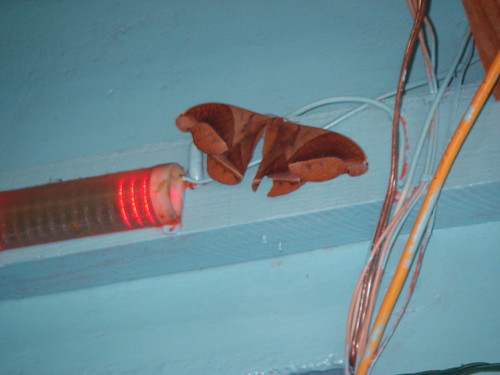
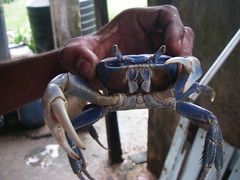
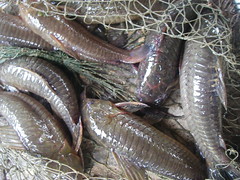
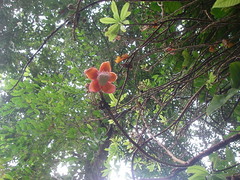
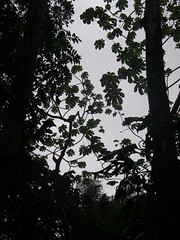
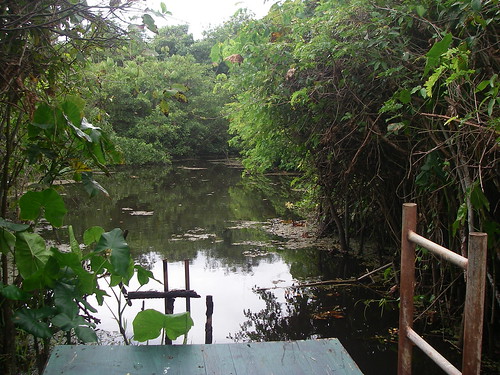
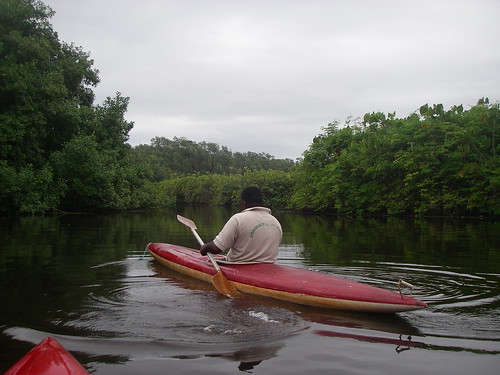
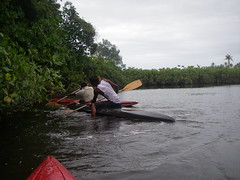
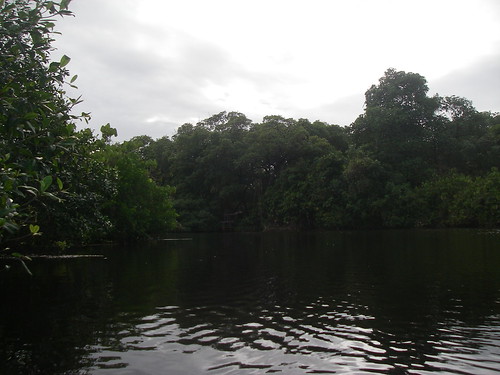
January 22nd, 2010 at 14:59
[…] only I had a kayak, like in Trinidad. No sooner had I thought it that my gaze fell on a sign near the bar. There were kayaks for […]